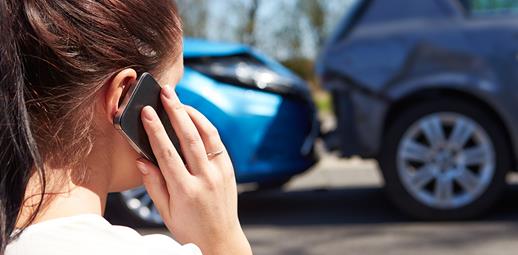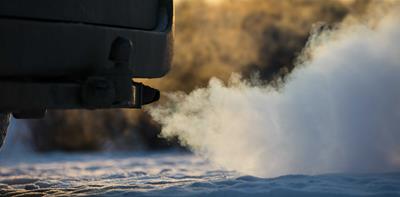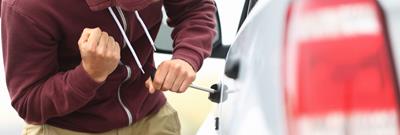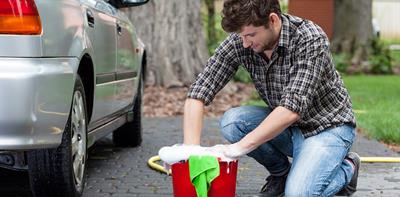
Whether it’s a small bump or a more serious collision, being involved in a car accident is a stressful experience.
Motorists not only need to deal with the aftermath of the incident, but they also need to make sure they’ve got everything they need for a car insurance claim if any repairs are needed.
There’s no need to panic though; a little bit of preparation can go a long way. To help you out if you ever need it, we’re sharing what to do in the event of a car accident in the UK.
At a glance
What needs to be done immediately after a car accident? What details do you need to record? What happens in your car is a write-off? Here’s everything you need to know and do if you’re ever involved in an accident.
What should I do immediately after a car accident?
- Stop the car as soon as you can – it's against the law to drive away even if you’re not at fault so make sure you stop in a safe space.
- Turn off your engine
- Turn on your hazard lights
- Check yourself and passengers for injuries – make note of any injuries.
- Get out of your car carefully and check the scene – if someone is hurt, or there are vehicles blocking the road, call the police and an ambulance.
- Speak to other drivers and exchange details – take details from others involved in the accident, including their name, address and car registration number. Make sure you don’t apologise or admit fault as this verbal statement could be used against you when making a compensation claim and ultimately invalidate your claim.
- Talk to passengers or witnesses
- Take photos – take plenty of pictures of the scene of the accident, particularly of the damage to any vehicles, but also of the positioning of the vehicles. You can never provide an insurer with too much information, so the more photos, the better.
- Call your insurance provider – contact your insurer as soon as possible after the incident. This applies even if you don’t want to make a claim on your policy. You still need to notify your insurer about the accident.
What information should I record after a car accident?
As we’ve mentioned, there are a few details you need to jot down when a car accident occurs. This includes:
- The other car’s registration, make, model and colour
- Name, address and contact details of the other driver and witnesses
- Driving licence details of anyone involved
- Insurance details of the other driver
- Time, date, weather conditions and road conditions at the time of the accident
- Any injuries to drivers, passengers or pedestrians
- Details of the registered owners of any other drivers involved
- The case reference number and address of the police station (if the police are called to the scene)
What should I do if I’m involved in a car accident on the motorway?
A car accident is scary no matter where it occurs, but a busy motorway can add to your stress. In this case you should:
- Turn your hazard lights on
- Pull onto the hard shoulder if possible
- Exit the car through the passenger side and stand behind the motorway barrier
- Try to use an emergency SOS telephone which will connect you to the police or highway authority
- Wait behind the barrier until help arrives.
Reporting a car accident to my insurer
Once you’ve checked that everyone is safe and well, you should contact your insurer, even if you don’t want to make a claim.
Failure to do so within the set period laid out by your car insurance policy may invalidate your cover.
You should provide as much information as possible, including the name, address and insurance details of the third party involved in the accident and share your interpretation of events. If you have details of any witnesses, pass them on to your claims handler (if you are making a claim) and share any photos or footage in your possession.
If you do want to make a claim, you should follow your insurer’s instructions on what to do next.
What insurance details do I have to give after a car accident?
If you’ve been involved in a car accident, before you give your insurer a call, make sure you have the information they’ll need. This includes:
- Your policy number (and other information to identify you)
- The reg number of the cars involved
- Name and contact details of the drivers involved
- Other drivers’ insurance details
When should I get my car repaired after a car accident?
If your vehicle is no longer driveable, and you have comprehensive insurance that covers the damage, then your insurer will decide if the car is a write off or repairable. If it is repairable then they will send an approved repairer to collect the vehicle and begin repairs.
Most insurers will provide a replacement vehicle while yours is being repaired by an approved repairer. But be sure to check your policy, as this isn't always the case.
If your car has only suffered a bump or two, or perhaps a few scratches, then you may opt to take it to a garage of your choice. In these situations you will need to get an estimate for the costs of the repairs. They can’t start until you get your insurer's approval.
Bear in mind that your insurer may opt to send out an engineer to assess the work too. It is also worth knowing that sometimes there maybe an additional excess to pay if you do not use the insurer’s recommended repairer.
What happens if my car is a write off?
It may be that the damage to your car is so extensive that repairs are either not possible or worthwhile.
In these instances our claims department will offer you a settlement amount. This will be subject to a host of factors including receiving your current MOT certificate and various deductions, such as your policy excess.
Should I call breakdown service after a car accident?
If you’ve got comprehensive insurance and are claiming for damage, you should contact your insurer asap and they can arrange for roadside recovery.
If the car is not roadworthy after an accident, your insurer can arrange to get you and your passengers home or to your planned UK destination.
Alternatively, they may reimburse you for transport costs incurred to get you and your passengers home or to your planned UK destination.
Should I report a car accident to the police?
According to the Road Traffic Act 1988, those involved in a collision as a driver or rider must personally report the incident to the police as soon as possible (within 24 hours of the collision).
You can report it either by using the online road traffic incident reporting service or by going to your local police station.
Do I have to report minor car accidents to the police?
If you’ve been involved in a minor collision that caused only minimal damage to the vehicles and nobody was injured, you don’t need to report it to the police.
But make sure you’ve exchanged details with the other driver so that the insurers have what they need.
How long will a car insurance claim take?
There’s no set answer to this, unfortunately. It all depends on the circumstances of your case.
However, there are steps you can take to make sure the claim moves forward as quickly as possible. These include providing your insurer with all the important details of the accident from the outset, making sure you have the money to pay the excess on your claim and being flexible about which garage to use for any repair work.
What happens if the car accident wasn’t my fault?
If you’re involved in a car accident that isn’t your fault, the insurance provider of the driver who is at fault will handle any vehicle repairs that you need.
What happens if the car accident was my fault?
If the car accident is your fault, your insurer will pay for your damage but only if you have valid, comprehensive insurance and the damage is covered. You will have to pay the excess on your policy and you’ll lose a portion of any no-claims bonus unless your no claims discount is protected.
If the other party was injured and seeks compensation, your insurance company will pay the claim if it's successful. You may also find your premium increasing.
How do you know who is at fault for a car accident?
Insurance companies will ultimately decide who is at blame for a car accident after taking police reports and all evidence into account. According to the Highway Code, a driver who hits another car from behind is at fault.
What happens if the other driver doesn’t stop after a car accident?
It’s a criminal offence if the drivers involved in an accident do not stop. If the other driver doesn’t stop, you should let the police know within 24 hours. You should still gather as much information as you can from witnesses etc and note down anything you remember about the car or the driver (if you saw them). Then you should report the accident to your insurer.
What happens if I’m hit by an uninsured driver?
If you’re hit by an insured driver, you should first contact the police then your insurer. Uninsured driver protection guarantees that your no-claims discount will be reinstated and your excess reimbursed if you’re hit by an uninsured driver, provided that your insurer can establish that the accident is not your fault and the driver of the other vehicle is not insured. In order to be covered you will need to give your insurer the other vehicle’s make, model and valid registration number. If possible you should also supply the name and address of the person driving the other vehicle.
What should I do if I hit an animal?
According to the Road Traffic Act, you must notify the police if you hit a dog, donkey, mule, horse, goat or pig, by dialling 101.
Steps to take if you hit an animal:
- Stop when it’s safe to do so
- Move the animal to a safe place if possible
- If it has a collar, call the owner or take it to the nearest vet if possible.
What should I do if I hit a parked car?
You should stop and leave your contact details. Take notes and photos at the scene and then contact your insurer.
What happens if I’m injured in a car accident?
If you’re injured, you should seek medical care as soon as possible. Then contact your insurer if you want to make a claim.
You can find out more about our car insurance here.


